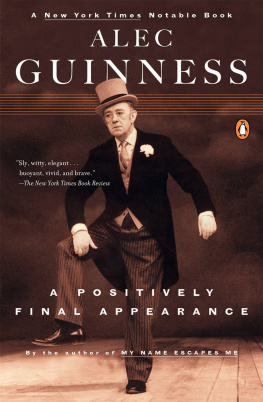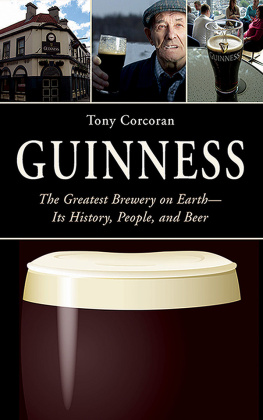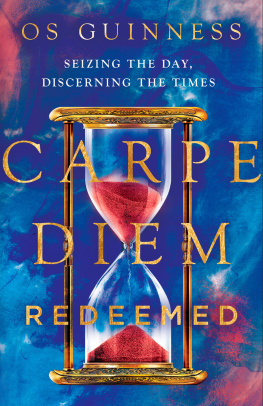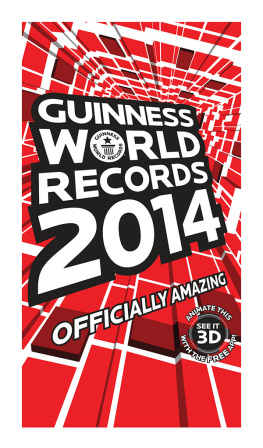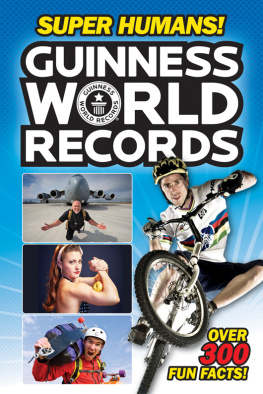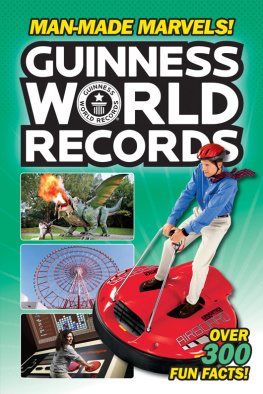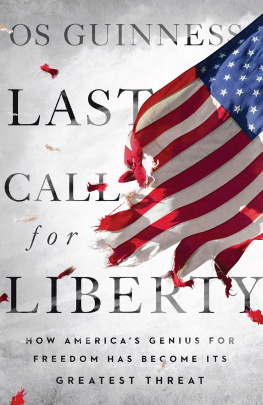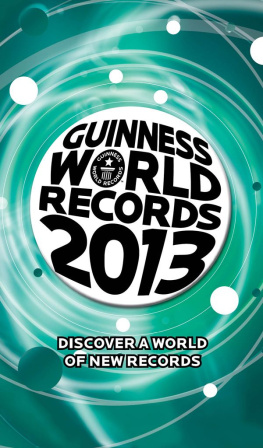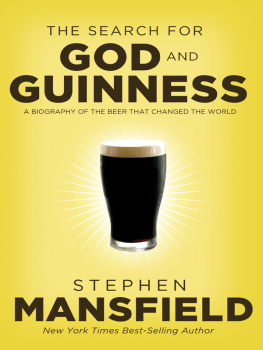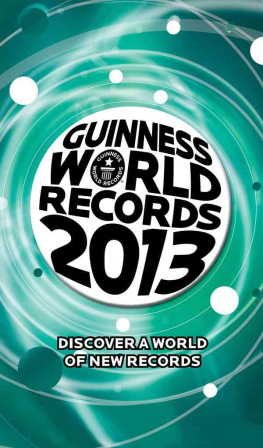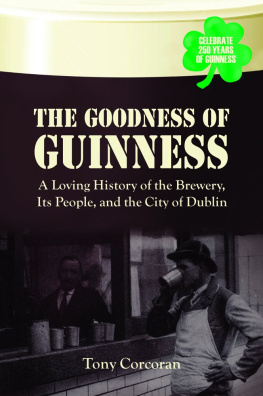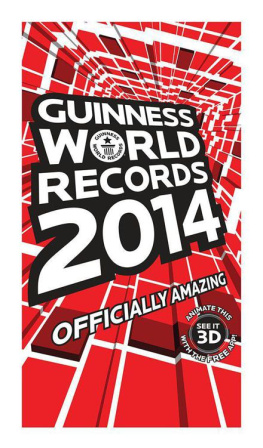PRAISE FOR ALEC GUINNESS AND MY NAME ESCAPES ME
Guinness writes deftly and with the wisdom of a man twice his age. Just as his acting speaks volumes with a half nod or a slight widening of the eyes, so does this volume speak of simple actslike going to church, reading Shakespeare, or monitoring the erratic health of his beloved wife, Merulawith such understated elegance and gentle wit that we think: This is how a life ought to be lived. People
Splendidly idiosyncratic Sir Alec is an accomplished writer, both in extended passages and in finely etched, memory-hugging one-liners. The New York Times Book Review (A Notable Book of the Year)
Impeccably observed, often poignant and amusing in the end, this intimate mix of the mundane, the name-dropping, and thoughtful musings on literature and life proves both edifying and entertaining. Theres a voyeuristic kick to be had in the reading of these brief records, but there is also, more significant, a sense of a very rich life lived. The Boston Globe
Reveals the octogenarian spryness of a civilized mind, and a beguiling mixture of the meditative and hedonistic. If St. Augustine dined at the Connaught, the result would be Alec Guinness. The Guardian
ALEC GUINNESS
A Positively Final
Appearance
A JOURNAL 1996-98
For Merula, yet again
But one man loved the pilgrim soul in you,
And loved the sorrows of your changing face.
W.B. YEATS
Preface
We live in an age of apologies. Apologies, false or true, are expected from the descendants of Empire builders, slave owners, persecutors of heretics, and from men who, in our eyes, just got it all wrong. So, with the age of eighty-five coming up shortly, I want to be in the swing of fashion and make an apology. It appears I must apologize for being male, white and European. I have never found much difficulty in apologizing to God or man for my wrong-doings; and yet, at the moment, I find it difficult to put into words the necessity for apologizing for this ramshackle book. It states it is a Journal and yet it doesnt quite aspire to that and it isnt a diary. Not many dates are to be found in it.
It is, I suppose, like a sort of sluggish river meandering hopefully towards the open sea but diverted by various eddies, pools or tangential tributaries. A straightforward diary would have been simpler; for with that at least you might have the daily excitement as to whether we would be heading shortly for Wolverhampton, a hilltop village in Italy or an English seaside watering-hole. A firm decision is rarely taken; and that about sums it up.
My gratitude must be expressed to the Spectator for permitting me to borrow a paragraph or two from articles I wrote for their Diary page a few years ago; and to various people for kindly allowing me to quote from poems or books under their control.
For the better part of a year I have grumbled daily at the task I had set myself, knowing that I was too often scraping the bottom of the barrel of memory. None of the above is likely to induce anyone to delve into his wallet or her pursebut then think what they would be missing!a perfectly genuine swansong, however lame. (When Pavlova, towards the end of her career, was dancing her famous Dying Swan at Edinburgh two Scots ladies at a matinee nudged each other and one said, Just like Mrs Wishart. And they fell about laughing.)
The photograph on the cover is of me as Dr Wicksteed in Alan Bennetts Habeas Corpus, in 1973. I had asked Alan, and Ronald Eyre, who directed the play, if I might have a little solo dance at the very end depicting rapid decline, stiffening joints, decrepitude and the fear of old age and death. It was simply and effectively choreographed by Phiz Fazan for someone with no terpsichorean talent at all. The title of the book I chose from the stickers frequently seen pasted across old theatrical posters in the provinces, which were usually meaningless, as the actors allegedly making their final appearances often bobbed up again within a year. This is mostly explained in a chapter called Mummers on the Road, taken from Rembrandts sketch Two Mummers on Horseback, reproduced on the back of the book cover by kind permission of the Pierpont Morgan Library in New York.
My appreciative thanks must go to Christopher Sinclair-Stevenson and Tony Lacey, who put their heads together to cajole, bully and encourage me to continue with a task about which I have been very doubtful. If they shared my doubts they managed to conceal the fact successfully, helpfully and with charm.
I would also like to thank my dogs Japheth, Dido and Flora, who instinctively knew the right moments to interrupt me with their urgent demands for treats. And also the birds outside my study window, who constantly reassured me that nothing is desperately important and the joy of life is just looking at it.
1. Men as Trees, Walking
The view from the small, spotless white room on the twelfth floor of the hospital was almost Wordsworthian: the Houses of Parliament glowing in summer afternoon sunlight, the mud-coloured Thames slowly eddying as the tide turned and a string of barges chugging towards Westminster Bridge. The river probably wasnt as brown as it looked; the outside of the hospital window was filthy. I wondered if it would all look clearer to me in two days time or possibly dimmer; clever people were to operate on my left eye, which had been almost useless for ten years and virtually blind for the past twelve months.
A voice behind me said, Im your sister. I turned round rather sharply to be confronted by a stalwart young man fluttering sheets of paper. Would you please fill in these forms? he said. And accounts would like a cheque. Oh, and the TV isnt working. He disappeared and I studied the small print.
The forms, as far as I could make out, required my agreement to exonerate the hospital, staff, doctors and surgeons from all culpability should there be any mishap. In short, the operation was all my fault and no questions asked. Well, I had to sign; and then I wrote a surprisingly large cheque, unpacked my small suitcase and settled myself, as best I could, on a slippery chair by the window with the latest Patrick O Brian novel unopened on my lap. The sister-chap reappeared to say they would like to do some tests on me on the ground floor and a thousand miles away.
Having successfully bypassed a starch-faced nurse who was suspicious of me wandering around in her area, I eventually found the team who were to operate on me the next day. They were housed in a vast ill-lit cavern but exuded confidence and charm. One of them ran a sort of magic pencil over my eyelid while the others discussed with enthusiasm the swirling pictures they saw on their little TV screen. I had the impression they were keen to take out my eye and give it a good scrub.
One of them said, We will now tell you what we intend doing.
I would rather not know, I said.
But you have to know, he went on, its the law.
More signing, I thought. You fire ahead, I told him, and Ill stop my ears. And I signed something which said I thoroughly understood what they were going to do. To this day I dont know what they got up to.
A very attractive, sophisticated, Argentinian lady with dazzling fair hair and a shimmering smile introduced herself as the anaesthetist. She asked me in a whisper if all my teeth were my own. I assured her they were and she gave a nod of relief and approval. We encountered each other again the following morning when I was wheeled into the presence of the team, who were now all dressed as for a TV medical soap opera. Is the Princess of Wales here? I asked facetiously. They smiled politely behind their gauze masks. The Argentinian lady took my hand. Just a little prick, she said. And now another little prick. Now I think we are feeling sleepy, yes?
Next page
